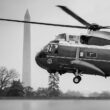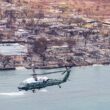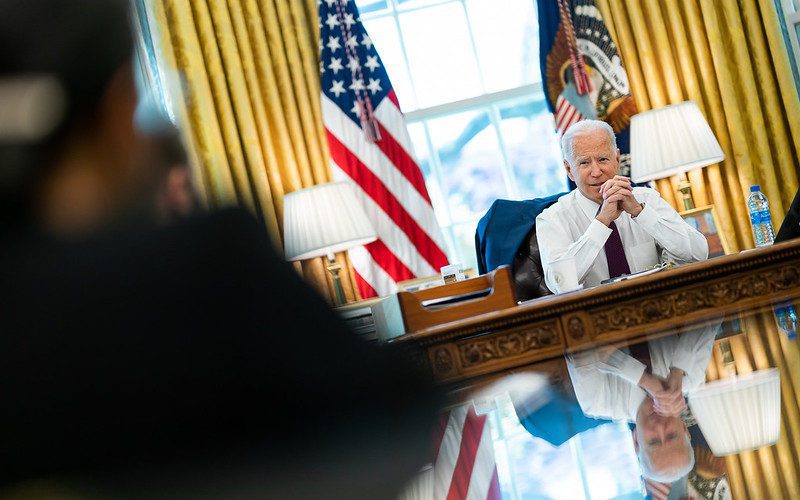Sign up here to receive The Yappie‘s weekly briefing on Asian American + Pacific Islander politics and support our work by making a donation.
Congress members on both sides of the aisle are calling on the Biden administration to reprioritize the Freely Associated States and designate an envoy for Micronesia in recognition of the Pacific region’s importance to U.S. military strategy.
Last week, Reps. Katie Porter (D-California) and Raúl Grijalva (D-Arizona) submitted a letter to the U.S. National Security Council’s top Asia official, demanding an envoy to manage talks with the Republic of Palau, the Republic of the Marshall Islands (RMI), and the Federated States of Micronesia (FSM), which first entered the Compact of the Free Association (COFA) with the U.S. after World War II.
In the 1970s, each territory began to pursue self-determination and sovereign governance, but sought to maintain their relationship with the U.S. while still having some form of independence. The U.S. agreed to give people from these countries free migration back and forth and provide funding for the three governments’ operations in exchange for military authority over much of their islands and oceans.
The compacts are term-limited and renegotiated every few years. But State and Interior officials leading the talks this past year “have stonewalled the islanders on key issues, the lawmakers wrote, including dealing with the leakage of U.S. radioactive waste in parts of the Marshall Islands, a relic of the Pentagon’s first nuclear tests in the 1940s and 1950s,” according to Foreign Policy.
Porter and Grijalva’s demand comes on the heels of a letter delivered to President Joe Biden as well as the Defense, Interior, and State Departments earlier this summer, in which 15 members of Congress described the relationship between the U.S. and Micronesian countries as vital due to a long shared history and “critical presents and futures.”
COFA’s benefits for the U.S. military, which include “the right to mutual control over an expanse of the Pacific as large as the 48 continental States,” highlight the Pacific’s importance, as both the U.S. and China court these countries with “economic leverage” and “financial assistance,” said the letter.
The compacts provide additional access to “shipping lanes coveted by our strategic competitors,” an economic advantage that the U.S. wields only through COFA.
If the U.S. hopes to maintain the “decades-old special and mutually beneficial relationship,” it must support the nations’ economic and social needs, the lawmakers said. That includes appointing a special envoy to help coordinate COFA’s federal renewal and work with Congress on the “substance of these negotiations to ensure swift approval of the agreements.”
Reps. Ed Case (Hawai’i-D), Kai Kahele (Hawai’i-D), Gregorio Kilili Camacho Sablan (I-Northern Mariana Islands), Michael San Nicolas (D-Guam), and Aumua Amata Coleman Radewagen (R-American Samoa) are among the signees pushing for greater action.
Islanders have said that some of the future trust funds meant to replace annual financial grants from the U.S. to COFA nations are insufficient, adding new urgency to the negotiations. Over 94,000 COFA citizens live in the U.S. and its territories under the compacts and contribute “to our economies and the diversity of our communities,” the 15 lawmakers wrote.
These compacts also allocate funding for regions—namely Guam, the Northern Mariana Islands, and Hawai’i—that see large immigration patterns from Palau, the RMI and the FSM. It’s meant to offset costs for the local governments after COFA migrants move to their state or territory.
“It is essential that we prevent a repeat of what happened with the previous renewal of the Compact with Palau, in which it took seven years to approve the agreement reached in 2010 due to differences between our executive and legislative branches on the source of funding, with Congress having to appropriate funds based on the previous agreement,” lawmakers noted.
“Furthermore, we believe that these agreements must be fully funded through mandatory rather than discretionary spending to ensure that our commitments are fully upheld over the next term of these agreements.”
U.S. officials have expressed growing alarm at the Chinese government’s influence in the area. The Chinese government has provided grants to help build homes in the islands, ships to be used for travel throughout the islands, and scholarships for islander students, the Honolulu Civil Beat reports.
Meanwhile in the U.S., COFA citizens have been treated as second-class citizens, facing barriers to employment or public services due to their migrant status, a less known type of non-citizen resident in the U.S.
After 25 years of advocacy from Micronesian communities, Congress restored Medicaid access for COFA citizens in the U.S. last December. In May, Sen. Mazie Hirono (D-Hawai’i) introduced a bill that would allow COFA citizens in the U.S. to access food stamps and other benefits, which they’ve been denied for decades despite paying federal taxes. The lack of aid hit Pacific Islander migrants especially hard during Super Typhoon Yutu and the COVID-19 pandemic.









